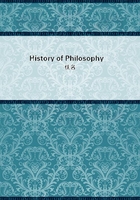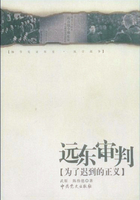The Dred Scott decision was accepted as orthodox Democratic doctrine by the South, by the Administration, and by the "Northern men with Southern principles." The astute masters of the game of politics on the Democratic side struck the note of legality. This was law, the expression of the highest tribunal of the Republic; what more was to be said? Though in truth there was but one other thing to be said, and that revolutionary, the Republicans, nevertheless, did not falter over it. Seward announced it in a speech in Congress on "Freedom in Kansas," when he uttered this menace: "We shall reorganize the Court and thus reform its political sentiments and practices."In the autumn of 1858 Douglas attempted to perform the acrobatic feat of reconciling the Dred Scott decision, which as a Democrat he had to accept, with that idea of popular sovereignty without which his immediate followers could not be content. In accepting the Republican nomination as Douglas's opponent for the senatorship, Lincoln used these words which have taken rank among his most famous utterances: "A house divided against itself cannot stand. I believe this government cannot endure permanently half slave and half free. I do not expect the Union to be dissolved. I do not expect the house to fall but I do expect it will cease to be divided. It will become all one thing or all the other. Either the opponents of slavery will arrest the further spread of it, and place it where the public mind shall rest in the belief that it is in the course of ultimate extinction; or its advocates will push it forward till it shall become alike lawful in all the states, old as well as new--North as well as South."No one had ever so tellingly expressed the deathgrapple of the sections: slavery the weapon of one, free labor the weapon of the other. Though Lincoln was at that time forty-nine years old, his political experience, in contrast with that of Douglas, was negligible. He afterward aptly described his early life in that expressive line from Gray, "The short and simple annals of the poor." He lacked regular schooling, and it was altogether from the practice of law that he had gained such formal education as he had. In law, however, he had become a master, and his position, to judge from the class of cases entrusted to him, was second to none in Illinois. To that severe yet wholesome cast of mind which the law establishes in men naturally lofty, Lincoln added the tonic influence of a sense of style--not the verbal acrobatics of a rhetorician, but that power to make words and thought a unit which makes the artist of a man who has great ideas. How Lincoln came by this literary faculty is, indeed, as puzzling as how Burns came by it. But there it was, disciplined by the court room, made pungent by familiarity with plain people, stimulated by constant reading of Shakespeare, and chastened by study of the Bible.
It was arranged that Douglas and Lincoln should tour the State together in a series of joint debates. As a consequence there followed a most interesting opposition of methods in the use of words, a contest between the method formed in Congress at a time when Congress was a perfect rhetorical academy, and that method of using words which was based on an arduous study of Blackstone, Shakespeare, and Isaiah. Lincoln issued from the debates one of the chief intellectual leaders of America, and with a place in English literature; Douglas came out a Senator from Illinois.
But though Douglas kept his following together, and though Lincoln was voted down, to Lincoln belonged the real strategic victory. In order to save himself with his own people, Douglas had been forced to make admissions that ruined him with the South. Because of these admissions the breach in the party of political evasion became irreparable. It was in the debate at Freeport that Douglas's fate overtook him, for Lincoln put this question: "Can the people of a United States territory, in any lawful way, against the wish of any citizen of the United States, exclude slavery from its limits, prior to the formation of a state constitution?"Douglas answered in his best style of political thunder. "It matters not," he said, "what way the Supreme Court may hereafter decide as to the abstract question whether slavery may or may not go into a territory under the Constitution; the people have the lawful means to introduce it or exclude it as they please, for the reason that slavery cannot exist a day or an hour anywhere unless it is supported by local police regulations. Those police regulations can only be established by the local legislatures;and if the people are opposed to slavery, they will elect representatives to that body who will by unfriendly legislation effectually prevent the introduction of it into their midst. If, on the contrary, they are for it, their legislation will favor its extension. Hence, no matter what the decision of the Supreme Court may be on that abstract question, still the right of the people to make a slave territory or a free territory is perfect and complete under the Nebraska Bill."As to the moral aspect of his actions, Douglas must ultimately be judged by the significance which this position in which he placed himself assumed in his own mind. Friendly critics excuse him: an interpretation of the Dred Scott decision which explained it away as an irresponsible utterance on a subject outside the scope of the case, a mere obiter dictum, is the justification which is called in to save him from the charge of insincerity. His friends, today, admit that this interpretation was bad law, but maintain that it may have been good morals, and that Douglas honestly held it. But many of us have not yet advanced so far in critical generosity, and cannot help feeling that Douglas's position remains political legerdemain--an attempt by a great officer of the government, professing to defend the Supreme Court, to show the people how to go through the motions of obedience to the Court while defeating its intention. If not double-dealing in a strict sense, it must yet be considered as having in it the temper of double-dealing.* This was, indeed, the view of many men of his own day and, among them, of Lincoln. Yet the type of man on whom the masters of the game of politics relied saw nothing in Douglas's position at which to be disturbed. It was merely playing politics, and if that absorbing sport required one to carry water on both shoulders, why--play the game! Douglas was the man for people like that. They cheered him to the echo and sent him back to the Senate. So well was this type understood by some of Lincoln's friends that they had begged him, at least according to tradition, not to put the question at Freeport, as by doing so he would enable Douglas to save himself with his constituency. Lincoln saw further, however. He understood better than they the forces then at work in America. The reply reported of him was: "If Douglas answers, he can never be President, and the battle of 1860 is worth a hundred of this."* There are three ways of regarding Douglas's position: (1) As a daring piece of evasion designed to hold all the Democrats together; (2) as an attempt to secure his locality at all costs, taking his chances on the South; (3) as a sincere expression of the legal interpretation mentioned above. It is impossible in attempting to choose among these to escape wholly one's impression of the man's character.
Well might Yancey and his followers receive with a shout of joy the "Freeport Doctrine," as Douglas's supreme evasion was called.
Should Southerners trust any longer the man who had evolved from the principle of let-'em-alone to the principle of double-dealing? However, the Southerners were far from controlling the situation. Though the events of 1858 had created discord in the Democratic party, they had not consolidated the South. Men like Toombs and Stephens were still hopeful of keeping the States together in the old bond of political evasion.
The Democratic machine, damaged though it was, had not yet lost its hold on the moderate South, and while that continued to be the case, there was still power in it.














